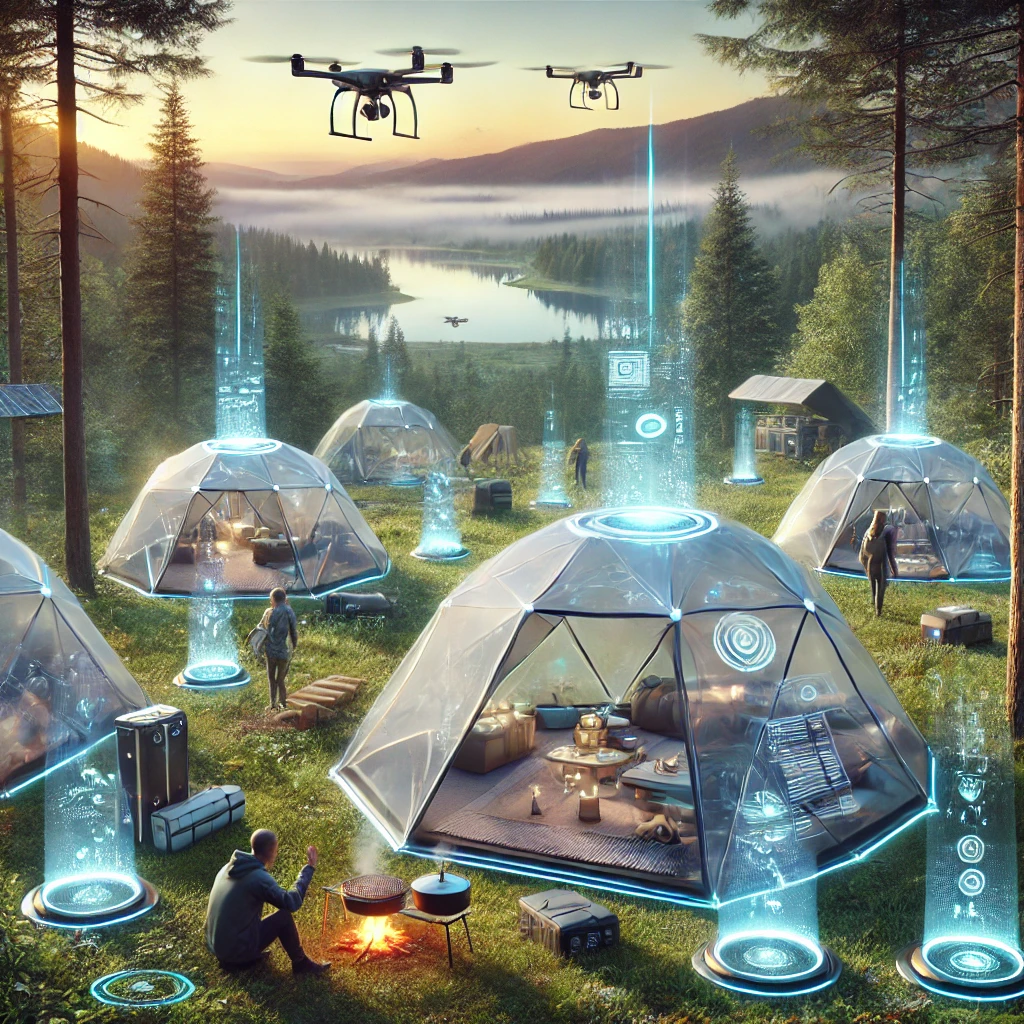**Disclosure:** We believe in honesty and transparency to the fullest extent. Some of the links on this blog are affiliate links, meaning, at no additional cost to you, we will earn a commission if you click through and make a purchase. This is one of the simplest ways you can support us.

As we embrace a new era of travel and adventure, the camping industry is undergoing a remarkable transformation. No longer is camping solely about pitching a tent in the wilderness with minimal comforts. Today’s campers are seeking experiences that merge outdoor exploration with luxury, technology, and sustainability. In this article, we’ll dive into the cutting-edge trends and innovations that are shaping the future of camping, offering unique opportunities for aspiring campground owners and entrepreneurs.
1. Emerging Trends in Camping
Camping has evolved far beyond its rustic roots, with new trends drawing a wider audience of adventure seekers and comfort enthusiasts alike. Here’s a closer look at the trends redefining the camping experience.
Glamping: Where Comfort Meets Nature
Glamping (glamorous camping) is taking the outdoor experience to a whole new level by combining luxury accommodations with nature. Forget roughing it—campers are now opting for upscale stays in lavish yurts, safari tents, and eco-friendly domes equipped with king-size beds, private baths, and gourmet dining. This trend is particularly attractive to younger generations who want the thrill of outdoor adventure without sacrificing modern comforts. For campground entrepreneurs, adding glamping options can significantly expand your customer base by appealing to luxury travelers.
Eco-Tourism: Camping with a Conscience
Sustainability is becoming a core focus for many travelers, and eco-tourism is at the forefront of this movement. Eco-conscious campers are gravitating toward campgrounds that prioritize environmental preservation, renewable energy, and low-impact living. These campgrounds often provide educational programs about local ecosystems and conservation efforts, appealing to travelers who want to leave a positive mark on the planet. For campgrounds, going green isn’t just a trend—it’s a smart business move. Emphasizing sustainability can boost your reputation and attract environmentally minded visitors.
Digital Detox Camps: Disconnect to Reconnect
As the world becomes increasingly reliant on digital devices, many campers are craving a tech-free experience. Digital detox camps, where guests are encouraged (or required) to disconnect from their devices, have become popular for those seeking an escape from the noise of modern life. These camps provide a unique selling point by offering visitors a chance to fully immerse themselves in nature, strengthen face-to-face connections, and recharge mentally. Offering this as an option could set your campground apart in an age where disconnecting is becoming a luxury in itself.

2. The Impact of Technology on Camping Experiences
While some campers seek to unplug, others want to integrate technology into their outdoor adventures. Innovations in tech are reshaping how campers experience the outdoors, making camping more accessible, convenient, and enjoyable.
Smart Campsites: A High-Tech Retreat
Forward-thinking campgrounds are implementing smart technology, allowing campers to enjoy modern amenities even in remote locations. Digital reservation systems, solar-powered charging stations, and campsite-wide Wi-Fi are just a few examples of how technology is enhancing the camping experience. For campground owners, integrating these technologies can make managing bookings smoother and improve customer satisfaction, especially for those who prefer a more connected outdoor experience.
Portable Solar Power: Eco-Friendly Energy on the Go
Campers no longer need noisy generators to power their trips. Portable solar panels and compact power banks have revolutionized how campers charge their devices, run small appliances, or light up their sites—all without harming the environment. As the demand for sustainable energy solutions grows, incorporating solar-powered amenities in your campground could attract a wider range of eco-conscious campers.
Outdoor Recreation Apps: Planning Adventures with Ease
The rise of outdoor apps has made planning camping trips easier than ever. Whether it’s finding the perfect campsite, navigating hiking trails, or discovering nearby activities, apps are helping campers make the most of their outdoor adventures. These digital tools offer campground owners new ways to engage with guests, from offering downloadable maps of the area to providing instant access to weather forecasts and wildlife sightings.
3. Predictions for the Future Growth and Direction of the Campground Industry
The campground industry is on the verge of a major growth spurt, fueled by increased demand for outdoor experiences and a push toward sustainability. Here’s what the future holds:
Increased Demand for Outdoor Adventures
The camping industry has been steadily growing, with more people seeking outdoor escapes to balance their busy, tech-driven lives. As urbanization rises, camping offers a much-needed opportunity to reconnect with nature, and this demand is set to continue. Entrepreneurs looking to enter the market should anticipate growing interest in campgrounds that offer diverse experiences, from rustic backcountry camping to luxury glamping getaways.
Micro-Camping: Urban Outdoor Escapes
Micro-camping is gaining popularity as a convenient alternative to traditional camping. These small-scale campsites are located near urban areas, making them accessible to city dwellers who want a quick nature retreat without the need for long travel. Offering micro-camping sites could be a lucrative option for campground owners looking to cater to urban adventurers who crave a nature break.
Sustainability and Green Practices
As sustainability becomes more important to travelers, campgrounds will increasingly adopt eco-friendly practices. This includes incorporating renewable energy sources like solar power, reducing waste through recycling programs, and sourcing locally produced goods. Campgrounds that embrace sustainability will not only help protect the environment but also enhance their appeal to a growing segment of eco-conscious travelers.
Virtual Reality Campsites: The Future of Camping?
In an intriguing development, virtual reality (VR) technology is beginning to make its way into the camping industry. VR campsites offer immersive, digital experiences where campers can explore simulated outdoor landscapes, embark on virtual hikes, and interact with wildlife—all from the comfort of their homes. While this may seem far from the traditional camping experience, VR could be a game-changer for people with mobility issues or those unable to travel to remote locations. For campground owners, this could present new opportunities for offering virtual experiences or promoting their sites to a tech-savvy audience.
Conclusion
The future of camping is bright and dynamic, blending the traditional joys of outdoor exploration with modern comforts, technological innovation, and a growing commitment to sustainability. For campground owners and aspiring entrepreneurs, these trends present exciting opportunities to enhance the camping experience, attract diverse visitors, and grow your business. Whether it’s offering glamping experiences, creating eco-friendly campsites, or embracing smart technology, the possibilities are endless. So gear up, innovate, and get ready to lead your campground into the future of outdoor adventure!










